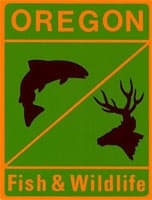Commission Sets $25 Penalty Fee for Failure to Report Deer and Elk Tags in Oregon
OutdoorHub 10.07.12

The Fish and Wildlife Commission today adopted a rule that will penalize hunters $25 if they fail to report deer and elk hunt results by the deadline.
The penalty will begin with the purchase of 2014 hunting licenses. Hunters that fail to report their 2012 deer and elk tags by the deadline (Jan. 31, 2013 for most tags) will have to pay the one-time $25 fee to purchase a 2014 hunting license. (These licenses go on sale Dec. 1, 2013.)
The Oregon State Legislature gave ODFW the ability to charge a penalty fee of up to $25 last year. ODFW staff had proposed a $10 penalty fee. But Commissioners voted to set the fee at $25 as they felt hunters who were not reporting would be more likely to take notice of the requirement with a higher fee. Some hunters also testified in favor of the higher fee.
Hunters can report online or by calling 1-866-947-6339. The automated system used for hunters that report by phone will soon be replaced by customer service representatives who can take hunt results over the phone, which should make things easier for any hunters that had trouble with the automated system.
Reporting hunt results for all deer, elk, pronghorn antelope, cougar, bear and turkey tags purchased (even when tags go unfilled or the buyer never went hunting) has been mandatory for several years. ODFW needs the information to determine harvest and effort levels, estimate populations and set tag numbers. But last year, the fourth year of “Mandatory Reporting” with no penalty, results were reported on only 41 percent of tags purchased.
Deer and elk tags are some of the most under-reported and information from these hunts is critical for setting tag numbers and seasons. But despite heavy promotion of the requirement and incentives for reporting, the reporting rate still isn’t high enough for ODFW to use the data. Another problem is that hunters who are successful are more likely to report than those that didn’t fill their tag, which skews harvest numbers.
ODFW has continued to survey hunters through phone calls in order to get useable harvest data, but needs to phase out these expensive calls. With so many people using cell phones and not providing their phone number, ODFW is also finding it more and more difficult to reach hunters by phone.
In other changes to the 2013 Big Game Regulations, the Commission:
- Cut antlerless elk hunting on national forestland on the west slope of the Cascades and in the Ochoco Unit, due to declining elk numbers on National Forest lands. Archers, muzzleloader hunters and hunters with Disability permits will no longer be able to take any elk—the bag limit will be a legal bull.
- Offer two types of archery tags for the Ochoco Unit, one with a one elk and one with a bull-only bag limit. The total number of archery tags in each category will be determined next June but antlerless harvest on National Forest land will be reduced, again to help boost populations.
- Change spike-only archery tags from general season to controlled in three premier elk units, Mt Emily, Walla Walla, and Wenaha. The purpose of the rule change is to close a loophole that allowed spike-only tag holders with general season tags to poach trophy elk in these units but pretend to have shot the elk elsewhere. Bowhunters that choose to hunt one of these trophy units will be limited to these units.
- Require an archery elk tag to archery hunt deer in the Mt Emily, Walla Walla, and Wenaha units, again to reduce poaching.
- Limit camping to designated sites and end cross-country motor vehicle travel on the White River Wildlife Area.
- Change some boundaries to travel management areas.
- Reduce size of bowhunting closure area in the Columbia Basin unit.
- Clarify the definition of “spike only” and proof of sex requirements.
The Commission also amended the state’s wildlife integrity rules to make it easier for people to raise tilapia for personal consumption. The new rules specify that a fish propagation permit is not required to raise tilapia indoors (defined as an enclosed structure) for personal use and list the four tilapia species that can be reared – Mozambique, Nile, Wami and Blackchin. Individuals must still purchase a fish transportation permit from ODFW to move live fish from the point of sale to their home.
Finally, the Commission heard the annual progress report from the Salmon and Trout Enhancement Program (STEP) program and a briefing on the Mule Deer Initiative and the Oregon Sage-Grouse Conservation Strategy.
The Commission is the policy-making body for fish and wildlife issues in the state. The seven-member group usually meets monthly but their next meeting is not until Dec. 7 in Portland.

